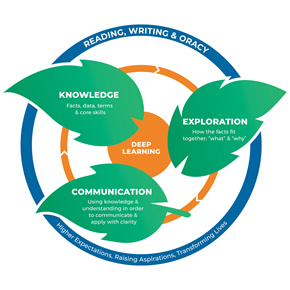Curriculum Overview
CCHS Subject Outlines
To understand what your child is being taught, across the subjects and year groups, please follow the links to our Curriculum Overviews, separated by year group.
• Year 7 Curriculum Overview 2025-26
• Year 8 Curriculum Overview 2025-26
• Year 9 Curriculum Overview 2025-26
• Year 10 Curriculum Overview 2025-26
• Year 11 Curriculum Overview 2025-26
• Sixth Form Curriculum - see our Sigma Sixth College
For more detailed curriculum information, including individual subject content available by subject and by year group, please visit our Curriculum micro-site - Click here
Curriculum Intent
As educators at CCHS we have developed a culture of high expectations for all, which raises aspirations transforming lives. We believe anything is possible if you have the right attitude to learning. Our taught school week comprises twenty 75 minute periods in years 7-11; teaching time per subject reflects the need to maintain a broad and balanced curriculum. Through our ambitious curriculum, and our PROUD values, which are threaded throughout, we aim to develop character and confidence making a positive difference to every young person's life chances, regardless of their starting point. Encouraging our students to explore all their talents and allowing them to experience a wide range of opportunities, opens their minds to a brighter future enabling them to achieve their dreams and goals, in short, to be successful...and transform their lives
Curriculum Delivery
At CCHS we know our students learn best through emotional engagement using stories, dilemmas, provocative art and controversies to ignite their curiosity. Humans are a curious, challenge seeking species, and being challenged is an entitlement for every child.
Our broad, ambitious, well sequenced curriculum delivered using pedagogical techniques such as Rosenshine's Principles, Cognitive Load Theory, Generative Learning, enables our students to learn and remember more, assimilate and apply their knowledge to different contexts giving them the confidence to articulate their ideas or challenge others.
Curriculum Aims
• Provide equal opportunities for all students regardless of gender, aptitude, cultural, ethnic or religious background.
• Have students at its heart, putting their interests above those of the institution.
• Prepare all students for a successful adult and working life in a 21st century global society.
• Value vocational and academic routes equally.
• Nurture the talents of all and celebrate success.
• Work with partner schools in the primary sector and Post-16 to ease transition and secure the broadest possible curriculum offer.
• Involve the community and parents/carers.
• Prepare students for further study, the world of work and to become active citizens.
• Develop positive personal and social values.
• Provide a variety of activities which bring about effective learning, provide appropriate challenges and lead to achievement for all.
• Provide continuity and progression from the point of transfer to the time of leaving school.
Curriculum Structure
• The curriculum is planned in a coherent manner ensuring it meets legal requirements, including those of the National Curriculum, and embraces cross-curricular themes including: careers information and guidance (CIAG); personal, social, health and economic education (PSHE); science, technology, engineering and mathematics (STEM); sex and relationships education (SRE); citizenship and crosscurricular skills, in particular those of literacy, numeracy and ICT. Modern British Values (MBV) are delivered throughout the curriculum and through our PROUD Learning days.
• We have audited our provision of the wider curriculum and where there is not full curriculum coverage, we ensure that these needs are met through enrichment opportunities and cross-curricula delivery.
• The development of students’ personal and social skills, and their spiritual and cultural development are addressed specifically through the PSHEE programme and school assemblies, as well as permeating the whole curriculum, both formal and hidden.
• The importance of developing ICT, literacy and numeracy, is recognised by the allocation of additional lessons at KS3 for students with prior attainment in English and mathematics below national expectations and a continuing emphasis on the further development of these skills across the whole curriculum.
• The range of subjects on offer in the school at Key Stage 3 and 4, and the qualifications they currently lead to, are detailed within our Curriculum micro-site.
